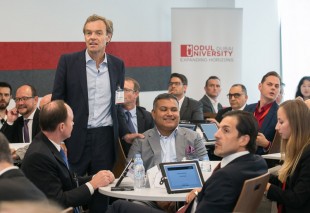

AHIC advisory panel meets to shape the show agenda

The planning for the 2017 Arabian Hotel Investment Conference (AHIC) has begun, with the AHIC Advisory Board having met at the newly inaugurated Modul University Dubai, AHIC’s official research partner, to discuss the top challenges the industry faces and to shape the theme for next year’s event.
Over 40 members, representing the region’s hotel investment, operations, consultants and asset management communities, came together to discuss current business as well as next year’s outlook for the region’s hospitality industry, and to brainstorm topics and themes for the 2017 Arabian Hotel Investment Conference.
In a poll, members described business this year as “challenging” and “difficult” with their outlook for 2017 continuing to be “challenging”.
This sentiment was amplified by the latest figures from STR, presented by Philip Wooller, which showed a decline in a number of leading key performance indicators for the industry, including a 9.6% decrease in RevPar across the Middle East, year-to-date.
Demand, however, continues to be positive with a growth of 2%, but with new supply up by 4.7%, further pressure on occupancies and room rates is likely in the short- to medium-term.
The Middle East is still the fastest-growing region for new hotel rooms as a percentage of existing supply worldwide. In addition, Dubai was the second market globally in terms of GOPPAR in 2015, just behind Tokyo.
Jonathan Worsley, chairman of Bench Events, who led the Advisory Board Meeting said in a statement: “It was great to see so many of the region’s senior hospitality leaders come together to discuss the industry’s key trends and to brainstorm topics and issues for debate at next year’s conference.
"Some of the key issues that were identified include the need for human capital to manage the new supply of hotel rooms in the region, the impact of technology on our sector and the importance of increased public and private sector collaboration to secure the future success of tourism and hospitality in the region.
“There is a vested interest in our industry with tourism being an increasingly important driver for countries, especially those that are looking to diversity their economies through investment in tourism and hospitality.“
He added: “In addition to addressing regional challenges and opportunities, the Advisory Board also stressed the importance of looking at global shifts, trends and events that will impact and shape the future of the hospitality industry here in the Middle East, which we will make sure to incorporate in the conference agenda.”
The theme for next year’s conference along with a preliminary agenda for the event is set to be unveiled in November.